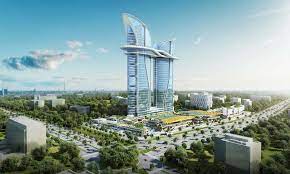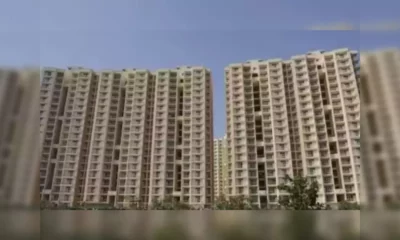Promotional Feature
Second wave threatens to sweep away Indian real estate market


The coronavirus pandemic caused a big setback to the real estate sector with property transactions plummeting last year when the nation went into a complete lockdown between March and June 2020. From minimal construction activities to a mass exodus of migrant workers, the year saw an unprecedented economic downturn. From insignificant buyer enquiries and site visits to never-ending restrictions on the construction activities, the crisis seemed to grow with each passing day.
Most Experts Got It Wrong
Around September-October last year, most experts went on record to say that the real estate market would recover completely by the onset of 2021, given that the buyer enquiries, site visits, and sales had started nearing the pre-COVID levels in most major cities. However, the second wave of the pandemic this year and with major cities like Mumbai, Bhopal, Lucknow, and Delhi-NCR undergoing partial lockdowns, the real estate sector has had to witness a setback. Some buyers have postponed their site visits, thus putting a temporary brake on the property transactions.
The Pandemic Effect
The extraordinary scale of the impact of the pandemic on the real estate market can be assessed from the mere fact that the sector has incurred a loss of over Rs. 1 lakh crore since the pandemic wreaked havoc (Source: KPMG). According to a report by KPMG, the pandemic caused an unprecedented capital liquidity crisis for all the major and small real estate developers. The credit shortage resulted in bringing down the residential sales from 4 lakh units in 2019-20 to 2.8 lakh units in 2020-21 across India’s biggest seven cities.
A report by India Ratings (Ind-Ra) paints an even more grim picture. According to it, the overall residential demand has declined by over 40 per cent in H1 of FY21. The agency believes that the sales will remain somewhat hindered until the pandemic situation is controlled successfully.
The restricted movement due to the lockdowns and vulnerable buyer sentiment has translated into an extraordinary increase in the unsold inventory as well. According to a report by Liases Foras, the lockdown resulted in a surge of approximately 25 per cent in unsold inventory from the end of FY-20 to the end of H1 FY21.
According to a report by Cushman and Wakefield, the net leasing of office spaces has reduced to 35 lakh sq. ft. appx. in the first quarter of this year from 70 lakh sq. ft. appx. vis-a-vis last year.
Even the retail segment has been hit severely by the second covid wave as most consumers are frightful of visiting malls and shops. According to data compiled by Statista, partial lockdowns and curfews across cities have resulted in the decline of retail mobility by 55 pc-60 pc across India.
What’s In Store For Us In 2021
At the start of this year, the market tried to gain momentum towards recovery, and just when it seemed the revival is in sight, the country has been struck by yet another wave of the pandemic.
The pace of sales generated over the last few months because of the record-low interest rates, lucrative offers from developers, stamp duty reduction, and renewed interest among the homebuyers for relatively bigger homes to accommodate their whole family, has slowed down.
The progress and success of the vaccination drive is expected to dictate the future trends and buyer sentiments. Making a property investment is capital-intensive and is often a once-in-a-lifetime kind of decision that a buyer makes; before zeroing in on any property, a buyer vehemently researches and physically visits many alternatives, and hence, the lifting of lockdowns and ease of movement restrictions is paramount to facilitate site visits and sales.


A Bright Future
As the vaccination drive is in full swing all across the nation, we are witnessing that the positivity rates are decling continuously after peaking at 30 pc in Delhi-NCR. We believe that the worse is already behind us, and it won’t be long when we would defeat COVID comprehensively. Some industry experts are of the firm opinion that the second pandemic wave will actually strengthen the demand for housing and commercial units. The work-from-home scenario has enabled buyers to look for homes even in semi-suburban areas. Many people have either shunned their jobs or have lost their jobs and are turning into entrepreneurs, and that sounds a promising bugle for the commercial real estate sector as well.
Industry leaders and stakeholders opine that the full recovery of the real estate market, both residential and commercial, is just around the corner, as buyers have already begun enthusiasticllay enquring about the new projects on phone and digitally.
As it is, according to a PropTiger.com report, the effect of the second wave has mostly impacted sales in the luxury and high-value segment. The affordable segment has actually been doing decently well all this time.
Major developers say that the industry will not only survive but may actually grow faster than ever if we as a nation beat the virus within the next 2-3 months.
Words of Hope
Bhutani is thoroughly optimistic when he says, “Era of lockdowns and restrictions on the construction activities is ending. At most, there could be sporadic partial lockdowns for a few days. The second wave of the pandemic has shaken the real estate market to its core, but ultimately, as always, we will come out victorious, albeit with a few bruises.”
-



 News3 weeks ago
News3 weeks agoKW Delhi 6 Mall Onboards New Brands
-



 News3 weeks ago
News3 weeks agoManasum Senior Living Launches IKIGAI GOA, A Senior Living Community in North Goa, in collaboration with Prescon Homes
-



 News2 weeks ago
News2 weeks agoGodrej Properties Sells Rs 3k cr+ Homes of Godrej Zenith, Gurugram, within 3 days
-



 News3 weeks ago
News3 weeks agoBridging India Divide: Top 5 Tier- 2 Cities to Focus On
-



 News3 weeks ago
News3 weeks agoCommercial Realty Gets Tech Savvy: Fast Construction, Enhanced Convenience
-



 News3 weeks ago
News3 weeks agoMultipoint Connection – A Definite Boon
-



 News2 weeks ago
News2 weeks agoRBI’s Status Quo on Key Policy Rates to Help Maintain the Real Estate Growth Momentum, Say Industry Stalwarts
-



 News3 weeks ago
News3 weeks agoSacred Cities See a Retail Boom as Spiritual Tourism Surge: CBRE Report



















